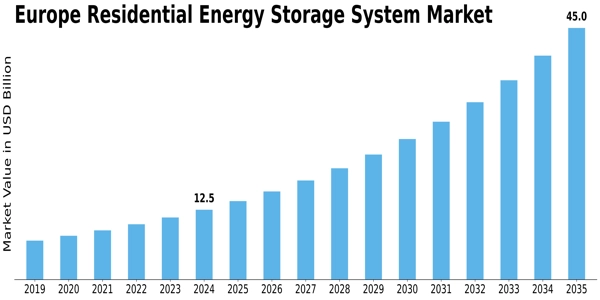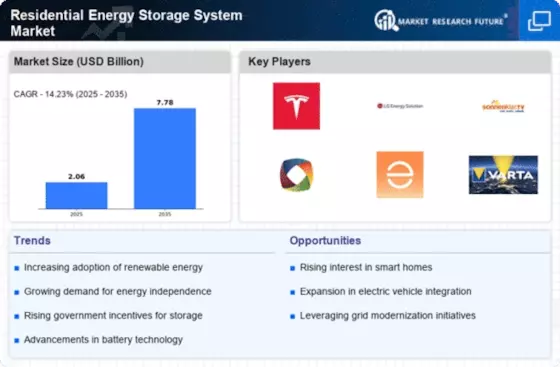Europe Residential Energy Storage System Size
Europe Residential Energy Storage System Market Growth Projections and Opportunities
The European residential energy storage system market is influenced by various market factors that shape its dynamics and growth trajectory. One significant factor is the increasing adoption of renewable energy sources such as solar and wind power. With growing concerns about climate change and the need to reduce carbon emissions, many European countries have set ambitious targets for renewable energy deployment. This has led to a rise in residential installations of solar panels and wind turbines, driving the demand for energy storage systems to store excess energy generated during peak production periods for use during times of low production or high demand.
Additionally, government policies and regulations play a crucial role in shaping the residential energy storage system market in Europe. Subsidies, incentives, and feed-in tariffs provided by governments encourage homeowners to invest in renewable energy systems and energy storage solutions. For example, countries like Germany and Spain offer generous feed-in tariffs for solar power generation, incentivizing homeowners to install solar panels coupled with energy storage systems to maximize their energy independence and financial returns.
Moreover, advancements in battery technology and declining costs have made residential energy storage systems more affordable and accessible to consumers across Europe. Lithium-ion batteries, in particular, have emerged as the preferred choice for energy storage due to their high energy density, longer lifespan, and rapid charging capabilities. As battery prices continue to fall and energy storage technologies mature, the cost-effectiveness of residential energy storage systems improves, driving further adoption among homeowners.
Market competition also influences the dynamics of the European residential energy storage system market. As the market grows, more companies enter the space, offering a wide range of products and solutions to cater to varying consumer needs and preferences. This competition fosters innovation and drives companies to improve the performance, efficiency, and affordability of their energy storage products, ultimately benefiting consumers.
Furthermore, the evolving energy landscape, characterized by the decentralization of power generation and the rise of prosumers (consumers who both consume and produce energy), is reshaping the residential energy storage market in Europe. Prosumers seek to optimize their energy usage, minimize reliance on the grid, and maximize self-consumption of renewable energy generated onsite. Energy storage systems enable prosumers to achieve these objectives by storing excess energy for later use, thereby reducing their dependence on traditional utility companies and increasing energy independence.
In addition to these market factors, consumer awareness and education play a crucial role in driving the adoption of residential energy storage systems in Europe. As consumers become more informed about the benefits of energy storage, such as reduced electricity bills, backup power during outages, and environmental sustainability, they are more likely to invest in these systems for their homes.
The European residential energy storage system market is influenced by various factors, including the increasing adoption of renewable energy, government policies and incentives, technological advancements, market competition, evolving energy landscapes, and consumer awareness. These factors collectively contribute to the growth and development of the market, driving innovation, affordability, and accessibility of energy storage solutions for homeowners across Europe.








Leave a Comment